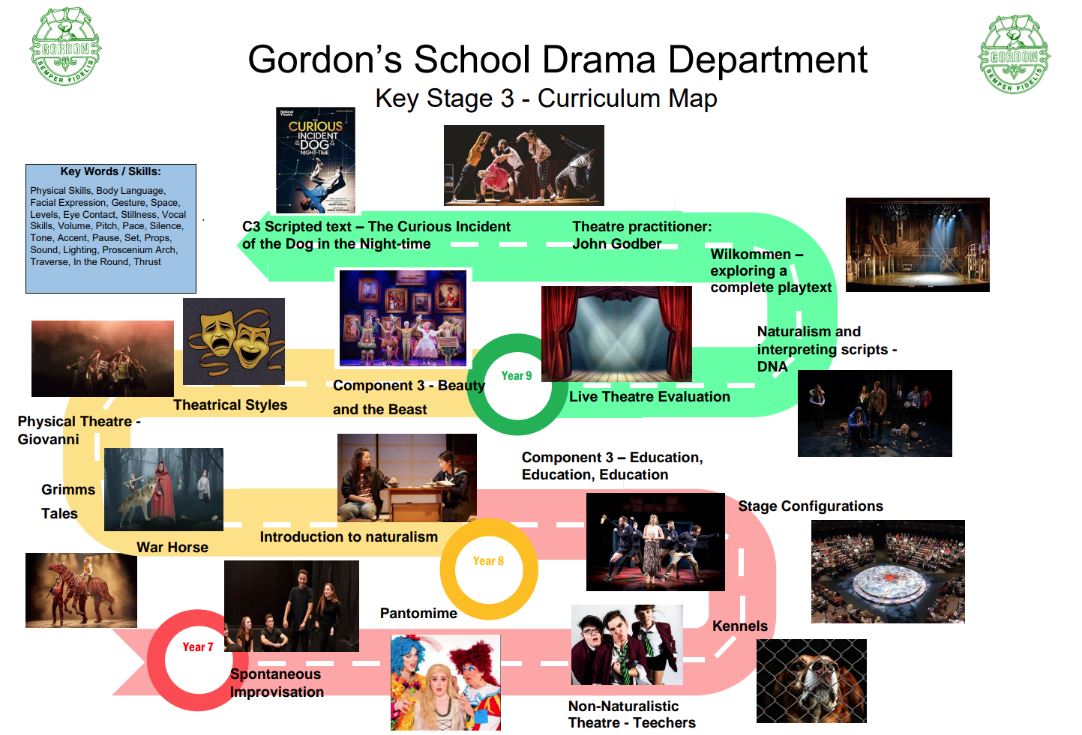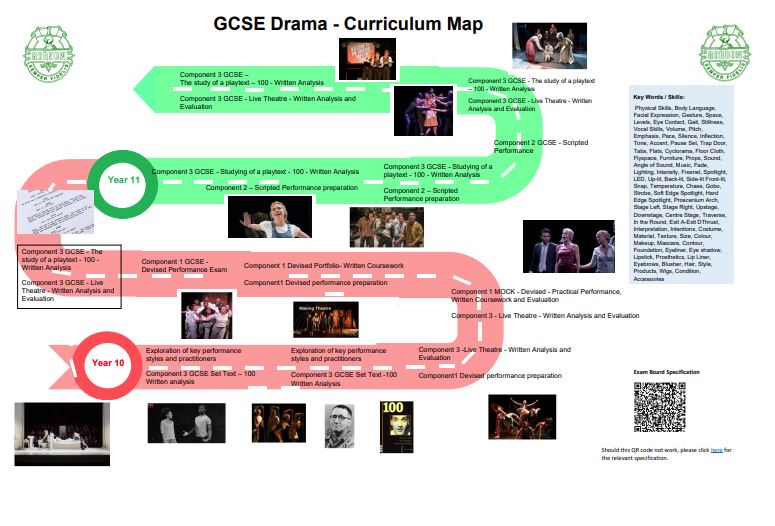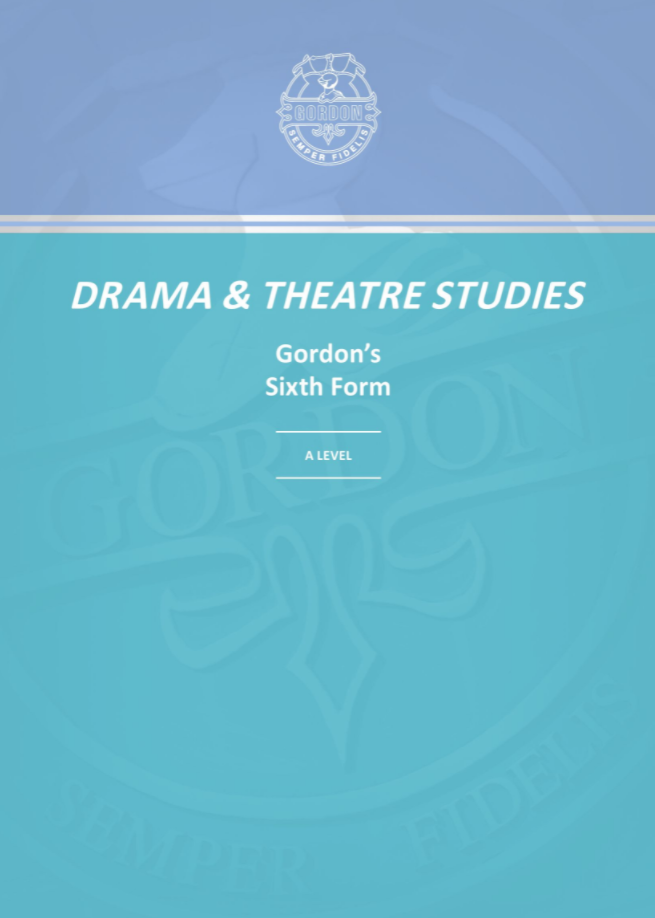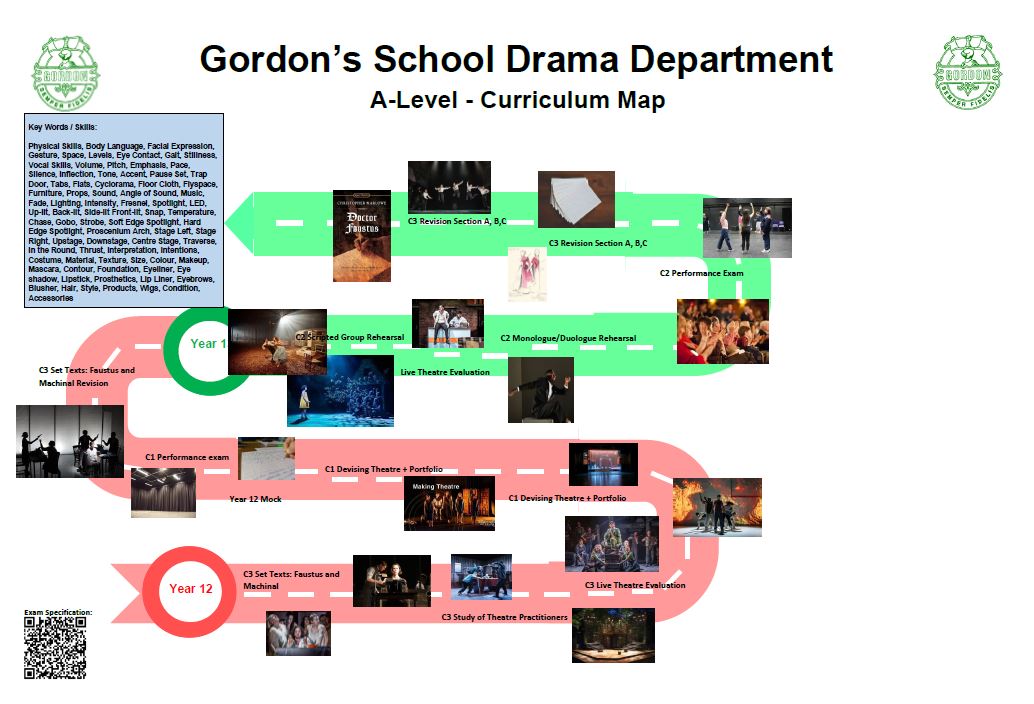Drama & Theatre Studies
Summary
All Key Stage 3 students are provided with a weekly Drama lesson. Through the Key Stage 3 curriculum students develop skills in group work, characterisation, communication and evaluation - whilst also developing their understanding of dramatic forms and techniques. Over the three years students will study a range of theatrical styles including naturalism, silent movies, melodrama, mask work and physical theatre. In addition to this, Drama at Key Stage 3 is used to explore, challenge and deepen students’ understanding of wider issues. The schemes of work provide opportunities for students to reflect on topics such as peer pressure, bullying and difference. We believe that studying Drama at Key Stage 3 equips our students with the skills of insight and empathy. The curriculum allows them to explore, in a safe environment, how another person might view or experience the world; consequently allowing them to better understand their own place in it.
Head of Department: Mrs McConville lmcconville@gordons.school
Summary
GCSE Drama is a popular option choice with students following the Eduqas syllabus. Students are taught in purpose built drama studios which are fully equipped with a range of sound, lighting and technical facilities. The course places strong emphasis on developing students’ ability to create and shape their own performance work. Students will acquire a breadth and depth of knowledge over the two years; including an understanding of how contemporary and historical theatre practitioners and genres have shaped how theatre works. During the course students’ will study at least two complete plays; see a vast amount of live theatre; take part as either an actor or designer in two formally assessed practical exams and develop skills in writing about and analysing theatre. The course provides a solid foundation for Drama and Theatre Studies A Level, whilst also being an effective platform for a range of career and study choices as it develops transferable skills such as creativity self-confidence, communication, evaluation and team work.
Course details
Examination
The course is examined at the end of Year 11.
Component 1: Devising Theatre
This component requires students to participate in the creation, development and performance of a piece of devised theatre using either the techniques of an influential theatre practitioner or a genre, in response to a stimulus
In the study of this component students will:
- Perform in, or design a piece of devised work.
- Write a creative log exploring the process of developing the performance work, written or audio.
- Write an evaluation of the devised piece.
Component 2: Performing a Text
Learners are required to participate in a performance from a text. Learners will gain a deeper understanding of how to interpret a text for performance and realise artistic intentions.
In the study of this component students will: Learners will be assessed on either acting or design.
Learners study two extracts from the same performance text Learners participate in one performance using sections of text from both extracts.
Learners must submit to the examiner a brief account of approximately 150 words (ie approximately half a side of A4) outlining their artistic intentions for the piece.
Component 3: Text in Performance
This component is a written exam. Students will study the set text of Find Me from the perspectives of directors, actors and designers. They are also to evaluate the work of a live theatre piece that they have seen during their GCSE year from the perspective of directors, actors and designers.
In the study of this component students will:
- Develop understanding of the texts’ original performance conditions
- Explore how the texts could be interpreted from a performance, design and directorial perspective
- Evaluate how directorial, design and acting decisions were used effectively within a piece of live theatre.
Summary
A Level Drama and Theatre Studies is a popular and demanding course. Students follow the Eduqas syllabus. As with GCSE, students are taught in purpose built studios which are fully equipped with a range of sound, lighting and technical facilities. The A Level requires that, over the two years, students study five different plays; see a diverse range of live theatre performances and take part in at least three formally assessed performance pieces as either an actor or designer. The course develops and demands high levels of creativity. Students learn about the styles and approaches of different practitioners and theatre companies and explore how they can use these in their own performance work. They develop in-depth theoretical understanding of how performance elements are applied to create meaning. They are required to demonstrate, in a written exam, their knowledge of how texts might be brought to life by actors, directors and designers.
Course details
Component 1: Theatre Workshop (Year 12 and Year 13): This component requires students to demonstrate skills and understanding in performance; either as actors or designers. In the study of this component students will perform in, or design for, a scripted monologue or duologue performance and write a creative log exploring the process of developing the performance work as well as develop a reinterpretation of a scripted extract and perform in, or design for it.
Component 2: Text in Action (Year 13 only): This component requires students to demonstrate skills and understanding of text based and devised performance, as well as the ideas and influences of particular theatre practitioners, companies and styles. In the study of this component students will devise and either perform in, or design, two pieces, and write a process and evaluation report exploring how both pieces were researched, developed and evaluate the dramatic effectiveness of the work.
Component 3: Text in Performance (Year 12 and 13): This component is a written exam. Students will study three set texts: Home, I'm Darling, Brief Encounter and The Book of Dust from the perspectives of directors, actors and designers. In the study of this component students will develop understanding of the texts’ original performance conditions, explore how the texts could be interpreted from a performance, design and directorial perspective, and develop ideas for the staging of the texts, demonstrating how the theatre they have seen has influenced them.
Entry Criteria
GCSE grade 6 in Drama if studied, or GCSE Grade 5 in English Language or English Literature.




